MS40046E: Analysis of Donoghue v Stevenson in Business Law Principles
VerifiedAdded on 2023/04/22
|7
|1899
|55
Case Study
AI Summary
This case study provides a detailed analysis of the landmark case Donoghue v Stevenson [1932] UKHL 100, examining its facts, the court's decisions, and the underlying legal principles. The case revolves around Mrs. Donoghue, who suffered illness after consuming ginger beer containing a decomposed snail. The analysis covers the initial interlocutory action, appeals, and the final judgment by the House of Lords, which established the principle of duty of care. The study further explores the reasoning behind the final decisions, including Lord Atkin's neighbor principle and its impact on negligence law. References to other relevant cases and academic sources are included to provide a comprehensive understanding of the case's significance in business law. Desklib offers a variety of resources for students, including past papers and solved assignments.
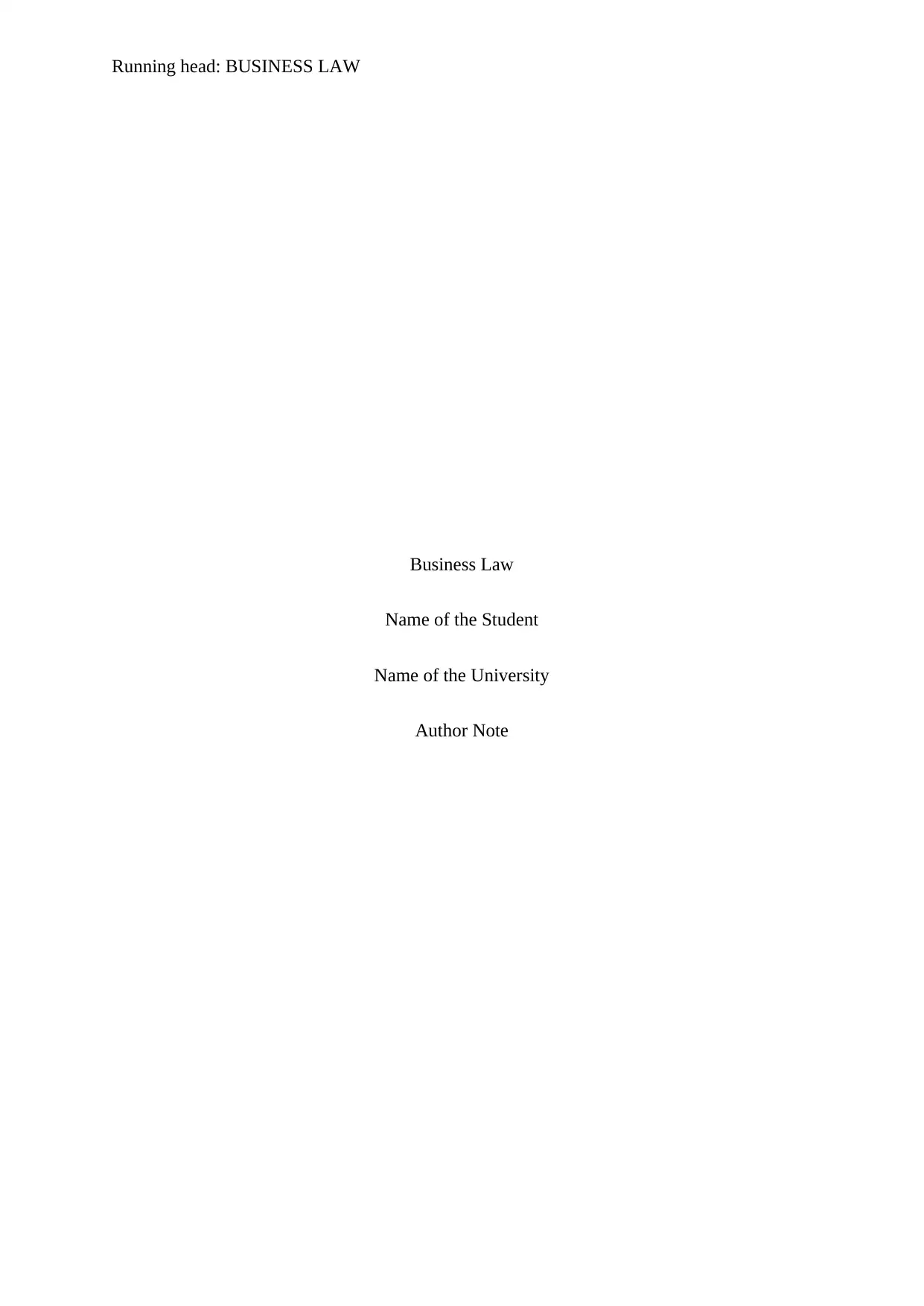
Running head: BUSINESS LAW
Business Law
Name of the Student
Name of the University
Author Note
Business Law
Name of the Student
Name of the University
Author Note
Paraphrase This Document
Need a fresh take? Get an instant paraphrase of this document with our AI Paraphraser
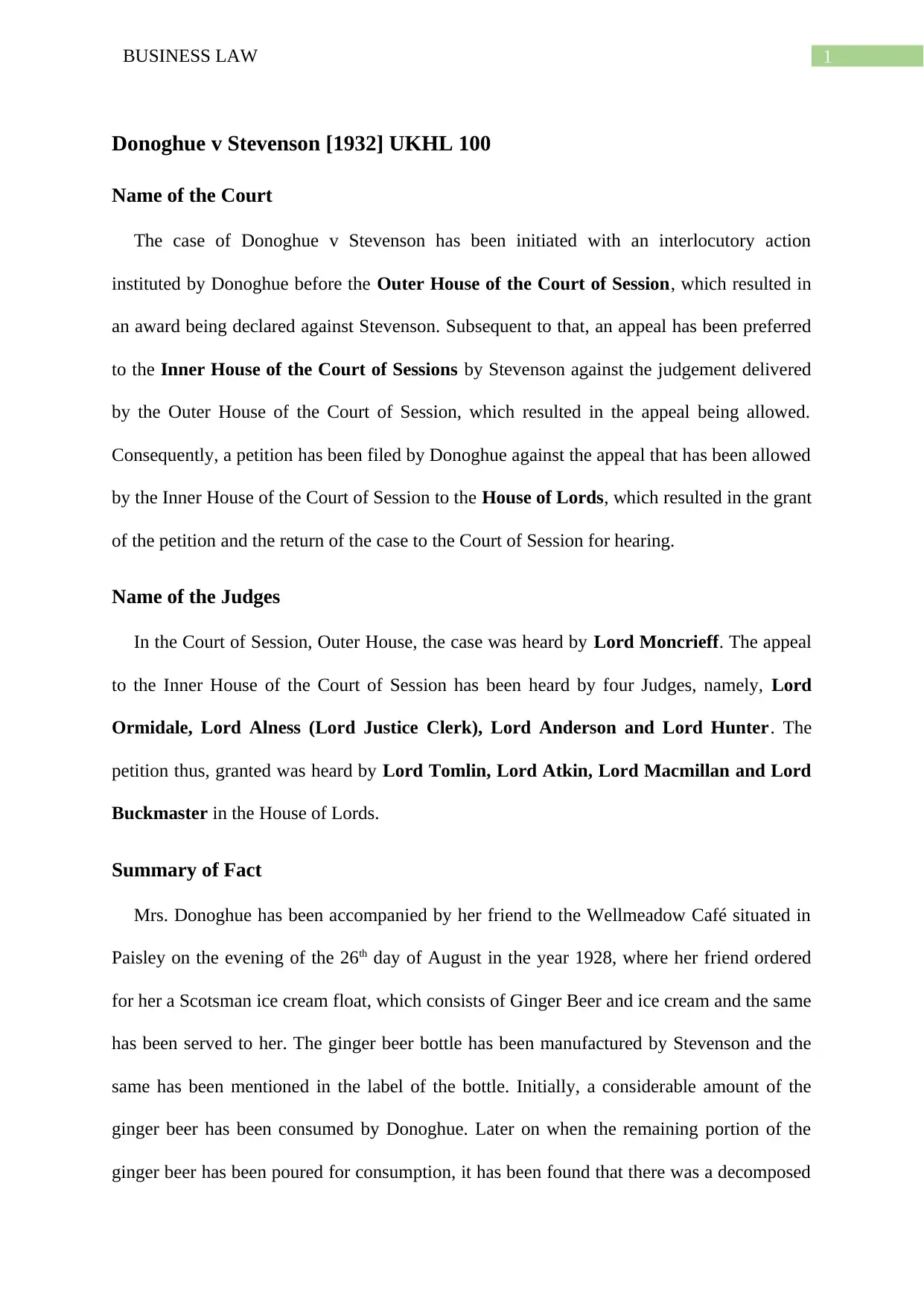
1BUSINESS LAW
Donoghue v Stevenson [1932] UKHL 100
Name of the Court
The case of Donoghue v Stevenson has been initiated with an interlocutory action
instituted by Donoghue before the Outer House of the Court of Session, which resulted in
an award being declared against Stevenson. Subsequent to that, an appeal has been preferred
to the Inner House of the Court of Sessions by Stevenson against the judgement delivered
by the Outer House of the Court of Session, which resulted in the appeal being allowed.
Consequently, a petition has been filed by Donoghue against the appeal that has been allowed
by the Inner House of the Court of Session to the House of Lords, which resulted in the grant
of the petition and the return of the case to the Court of Session for hearing.
Name of the Judges
In the Court of Session, Outer House, the case was heard by Lord Moncrieff. The appeal
to the Inner House of the Court of Session has been heard by four Judges, namely, Lord
Ormidale, Lord Alness (Lord Justice Clerk), Lord Anderson and Lord Hunter. The
petition thus, granted was heard by Lord Tomlin, Lord Atkin, Lord Macmillan and Lord
Buckmaster in the House of Lords.
Summary of Fact
Mrs. Donoghue has been accompanied by her friend to the Wellmeadow Café situated in
Paisley on the evening of the 26th day of August in the year 1928, where her friend ordered
for her a Scotsman ice cream float, which consists of Ginger Beer and ice cream and the same
has been served to her. The ginger beer bottle has been manufactured by Stevenson and the
same has been mentioned in the label of the bottle. Initially, a considerable amount of the
ginger beer has been consumed by Donoghue. Later on when the remaining portion of the
ginger beer has been poured for consumption, it has been found that there was a decomposed
Donoghue v Stevenson [1932] UKHL 100
Name of the Court
The case of Donoghue v Stevenson has been initiated with an interlocutory action
instituted by Donoghue before the Outer House of the Court of Session, which resulted in
an award being declared against Stevenson. Subsequent to that, an appeal has been preferred
to the Inner House of the Court of Sessions by Stevenson against the judgement delivered
by the Outer House of the Court of Session, which resulted in the appeal being allowed.
Consequently, a petition has been filed by Donoghue against the appeal that has been allowed
by the Inner House of the Court of Session to the House of Lords, which resulted in the grant
of the petition and the return of the case to the Court of Session for hearing.
Name of the Judges
In the Court of Session, Outer House, the case was heard by Lord Moncrieff. The appeal
to the Inner House of the Court of Session has been heard by four Judges, namely, Lord
Ormidale, Lord Alness (Lord Justice Clerk), Lord Anderson and Lord Hunter. The
petition thus, granted was heard by Lord Tomlin, Lord Atkin, Lord Macmillan and Lord
Buckmaster in the House of Lords.
Summary of Fact
Mrs. Donoghue has been accompanied by her friend to the Wellmeadow Café situated in
Paisley on the evening of the 26th day of August in the year 1928, where her friend ordered
for her a Scotsman ice cream float, which consists of Ginger Beer and ice cream and the same
has been served to her. The ginger beer bottle has been manufactured by Stevenson and the
same has been mentioned in the label of the bottle. Initially, a considerable amount of the
ginger beer has been consumed by Donoghue. Later on when the remaining portion of the
ginger beer has been poured for consumption, it has been found that there was a decomposed
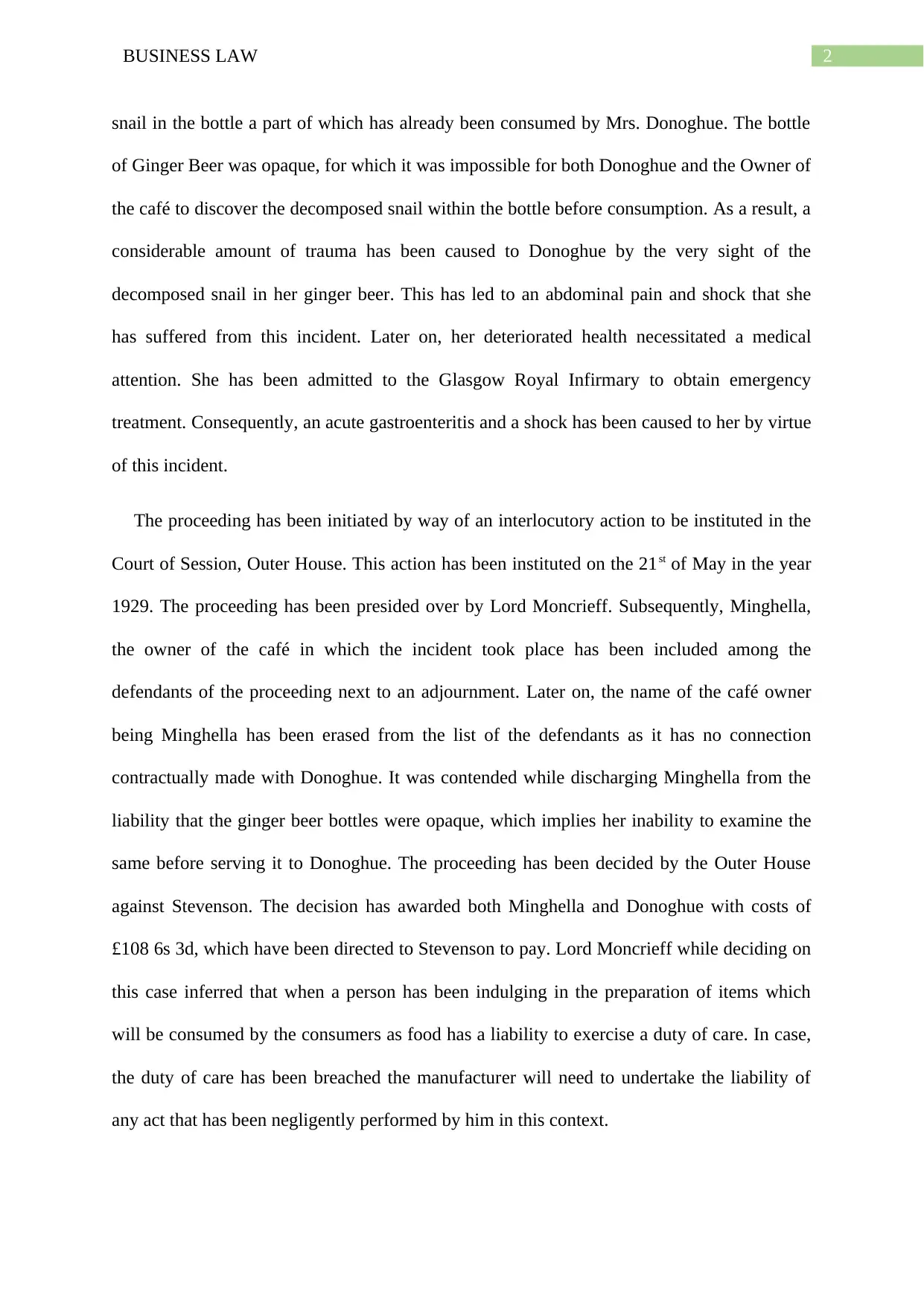
2BUSINESS LAW
snail in the bottle a part of which has already been consumed by Mrs. Donoghue. The bottle
of Ginger Beer was opaque, for which it was impossible for both Donoghue and the Owner of
the café to discover the decomposed snail within the bottle before consumption. As a result, a
considerable amount of trauma has been caused to Donoghue by the very sight of the
decomposed snail in her ginger beer. This has led to an abdominal pain and shock that she
has suffered from this incident. Later on, her deteriorated health necessitated a medical
attention. She has been admitted to the Glasgow Royal Infirmary to obtain emergency
treatment. Consequently, an acute gastroenteritis and a shock has been caused to her by virtue
of this incident.
The proceeding has been initiated by way of an interlocutory action to be instituted in the
Court of Session, Outer House. This action has been instituted on the 21st of May in the year
1929. The proceeding has been presided over by Lord Moncrieff. Subsequently, Minghella,
the owner of the café in which the incident took place has been included among the
defendants of the proceeding next to an adjournment. Later on, the name of the café owner
being Minghella has been erased from the list of the defendants as it has no connection
contractually made with Donoghue. It was contended while discharging Minghella from the
liability that the ginger beer bottles were opaque, which implies her inability to examine the
same before serving it to Donoghue. The proceeding has been decided by the Outer House
against Stevenson. The decision has awarded both Minghella and Donoghue with costs of
£108 6s 3d, which have been directed to Stevenson to pay. Lord Moncrieff while deciding on
this case inferred that when a person has been indulging in the preparation of items which
will be consumed by the consumers as food has a liability to exercise a duty of care. In case,
the duty of care has been breached the manufacturer will need to undertake the liability of
any act that has been negligently performed by him in this context.
snail in the bottle a part of which has already been consumed by Mrs. Donoghue. The bottle
of Ginger Beer was opaque, for which it was impossible for both Donoghue and the Owner of
the café to discover the decomposed snail within the bottle before consumption. As a result, a
considerable amount of trauma has been caused to Donoghue by the very sight of the
decomposed snail in her ginger beer. This has led to an abdominal pain and shock that she
has suffered from this incident. Later on, her deteriorated health necessitated a medical
attention. She has been admitted to the Glasgow Royal Infirmary to obtain emergency
treatment. Consequently, an acute gastroenteritis and a shock has been caused to her by virtue
of this incident.
The proceeding has been initiated by way of an interlocutory action to be instituted in the
Court of Session, Outer House. This action has been instituted on the 21st of May in the year
1929. The proceeding has been presided over by Lord Moncrieff. Subsequently, Minghella,
the owner of the café in which the incident took place has been included among the
defendants of the proceeding next to an adjournment. Later on, the name of the café owner
being Minghella has been erased from the list of the defendants as it has no connection
contractually made with Donoghue. It was contended while discharging Minghella from the
liability that the ginger beer bottles were opaque, which implies her inability to examine the
same before serving it to Donoghue. The proceeding has been decided by the Outer House
against Stevenson. The decision has awarded both Minghella and Donoghue with costs of
£108 6s 3d, which have been directed to Stevenson to pay. Lord Moncrieff while deciding on
this case inferred that when a person has been indulging in the preparation of items which
will be consumed by the consumers as food has a liability to exercise a duty of care. In case,
the duty of care has been breached the manufacturer will need to undertake the liability of
any act that has been negligently performed by him in this context.
⊘ This is a preview!⊘
Do you want full access?
Subscribe today to unlock all pages.

Trusted by 1+ million students worldwide
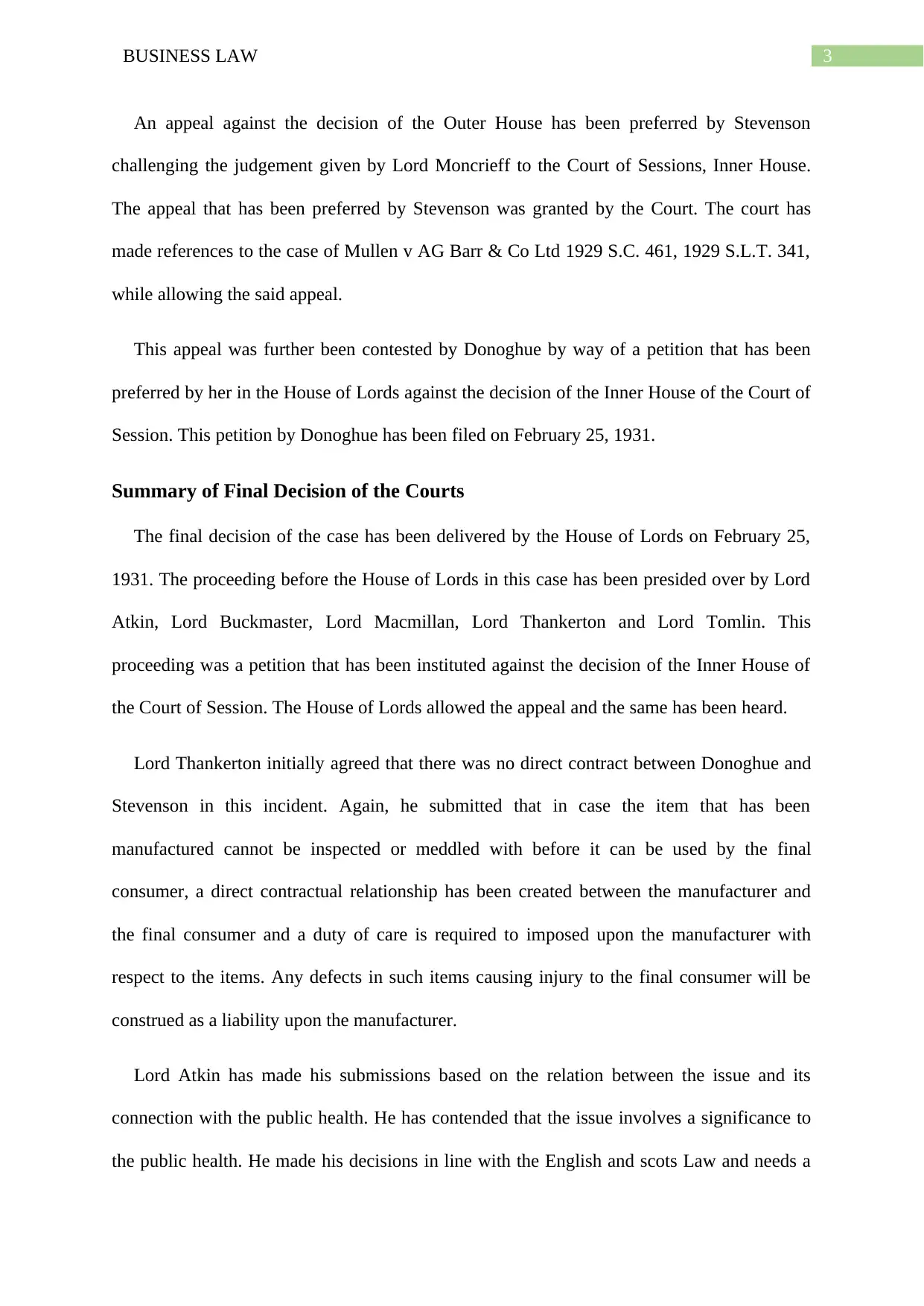
3BUSINESS LAW
An appeal against the decision of the Outer House has been preferred by Stevenson
challenging the judgement given by Lord Moncrieff to the Court of Sessions, Inner House.
The appeal that has been preferred by Stevenson was granted by the Court. The court has
made references to the case of Mullen v AG Barr & Co Ltd 1929 S.C. 461, 1929 S.L.T. 341,
while allowing the said appeal.
This appeal was further been contested by Donoghue by way of a petition that has been
preferred by her in the House of Lords against the decision of the Inner House of the Court of
Session. This petition by Donoghue has been filed on February 25, 1931.
Summary of Final Decision of the Courts
The final decision of the case has been delivered by the House of Lords on February 25,
1931. The proceeding before the House of Lords in this case has been presided over by Lord
Atkin, Lord Buckmaster, Lord Macmillan, Lord Thankerton and Lord Tomlin. This
proceeding was a petition that has been instituted against the decision of the Inner House of
the Court of Session. The House of Lords allowed the appeal and the same has been heard.
Lord Thankerton initially agreed that there was no direct contract between Donoghue and
Stevenson in this incident. Again, he submitted that in case the item that has been
manufactured cannot be inspected or meddled with before it can be used by the final
consumer, a direct contractual relationship has been created between the manufacturer and
the final consumer and a duty of care is required to imposed upon the manufacturer with
respect to the items. Any defects in such items causing injury to the final consumer will be
construed as a liability upon the manufacturer.
Lord Atkin has made his submissions based on the relation between the issue and its
connection with the public health. He has contended that the issue involves a significance to
the public health. He made his decisions in line with the English and scots Law and needs a
An appeal against the decision of the Outer House has been preferred by Stevenson
challenging the judgement given by Lord Moncrieff to the Court of Sessions, Inner House.
The appeal that has been preferred by Stevenson was granted by the Court. The court has
made references to the case of Mullen v AG Barr & Co Ltd 1929 S.C. 461, 1929 S.L.T. 341,
while allowing the said appeal.
This appeal was further been contested by Donoghue by way of a petition that has been
preferred by her in the House of Lords against the decision of the Inner House of the Court of
Session. This petition by Donoghue has been filed on February 25, 1931.
Summary of Final Decision of the Courts
The final decision of the case has been delivered by the House of Lords on February 25,
1931. The proceeding before the House of Lords in this case has been presided over by Lord
Atkin, Lord Buckmaster, Lord Macmillan, Lord Thankerton and Lord Tomlin. This
proceeding was a petition that has been instituted against the decision of the Inner House of
the Court of Session. The House of Lords allowed the appeal and the same has been heard.
Lord Thankerton initially agreed that there was no direct contract between Donoghue and
Stevenson in this incident. Again, he submitted that in case the item that has been
manufactured cannot be inspected or meddled with before it can be used by the final
consumer, a direct contractual relationship has been created between the manufacturer and
the final consumer and a duty of care is required to imposed upon the manufacturer with
respect to the items. Any defects in such items causing injury to the final consumer will be
construed as a liability upon the manufacturer.
Lord Atkin has made his submissions based on the relation between the issue and its
connection with the public health. He has contended that the issue involves a significance to
the public health. He made his decisions in line with the English and scots Law and needs a
Paraphrase This Document
Need a fresh take? Get an instant paraphrase of this document with our AI Paraphraser
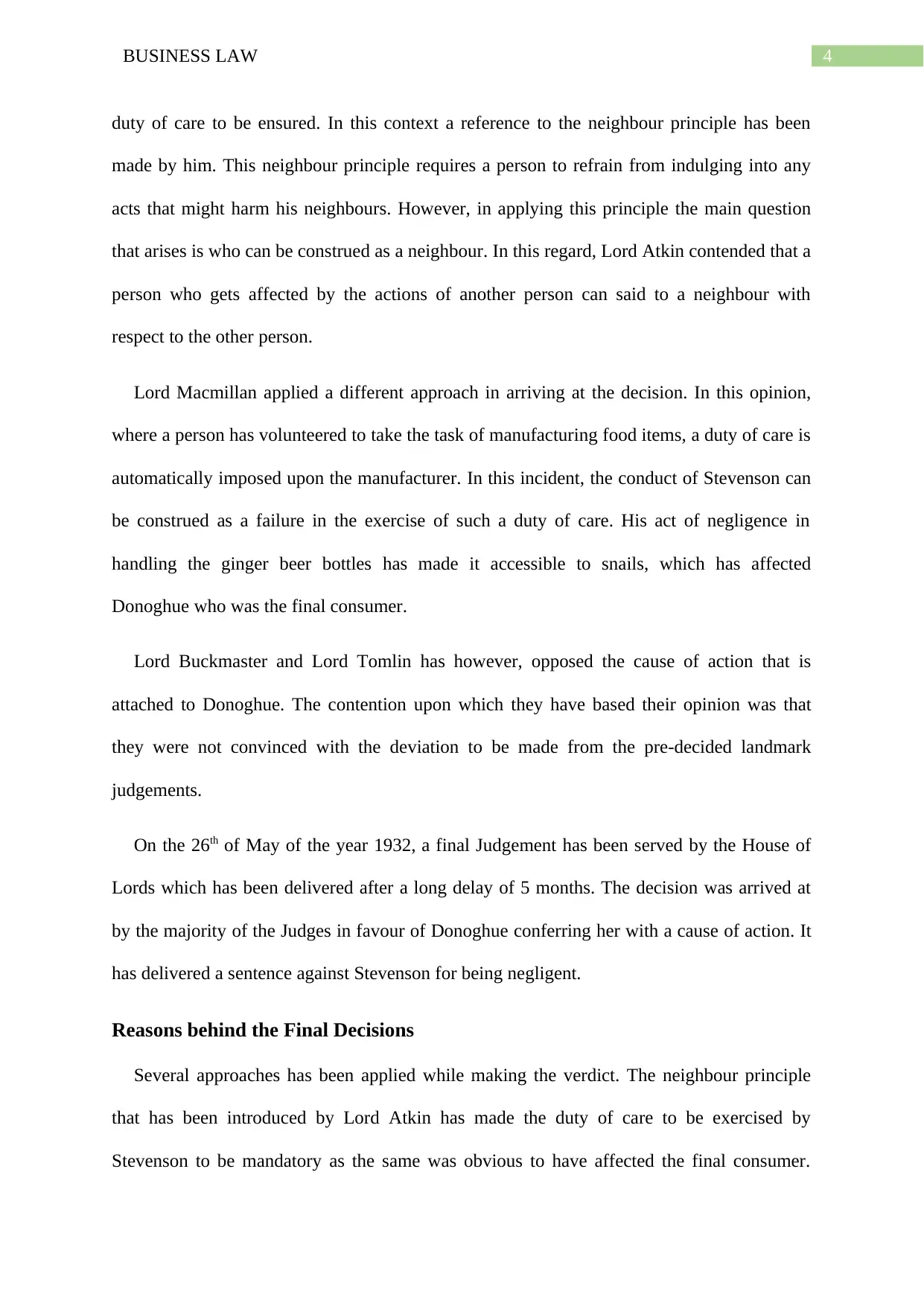
4BUSINESS LAW
duty of care to be ensured. In this context a reference to the neighbour principle has been
made by him. This neighbour principle requires a person to refrain from indulging into any
acts that might harm his neighbours. However, in applying this principle the main question
that arises is who can be construed as a neighbour. In this regard, Lord Atkin contended that a
person who gets affected by the actions of another person can said to a neighbour with
respect to the other person.
Lord Macmillan applied a different approach in arriving at the decision. In this opinion,
where a person has volunteered to take the task of manufacturing food items, a duty of care is
automatically imposed upon the manufacturer. In this incident, the conduct of Stevenson can
be construed as a failure in the exercise of such a duty of care. His act of negligence in
handling the ginger beer bottles has made it accessible to snails, which has affected
Donoghue who was the final consumer.
Lord Buckmaster and Lord Tomlin has however, opposed the cause of action that is
attached to Donoghue. The contention upon which they have based their opinion was that
they were not convinced with the deviation to be made from the pre-decided landmark
judgements.
On the 26th of May of the year 1932, a final Judgement has been served by the House of
Lords which has been delivered after a long delay of 5 months. The decision was arrived at
by the majority of the Judges in favour of Donoghue conferring her with a cause of action. It
has delivered a sentence against Stevenson for being negligent.
Reasons behind the Final Decisions
Several approaches has been applied while making the verdict. The neighbour principle
that has been introduced by Lord Atkin has made the duty of care to be exercised by
Stevenson to be mandatory as the same was obvious to have affected the final consumer.
duty of care to be ensured. In this context a reference to the neighbour principle has been
made by him. This neighbour principle requires a person to refrain from indulging into any
acts that might harm his neighbours. However, in applying this principle the main question
that arises is who can be construed as a neighbour. In this regard, Lord Atkin contended that a
person who gets affected by the actions of another person can said to a neighbour with
respect to the other person.
Lord Macmillan applied a different approach in arriving at the decision. In this opinion,
where a person has volunteered to take the task of manufacturing food items, a duty of care is
automatically imposed upon the manufacturer. In this incident, the conduct of Stevenson can
be construed as a failure in the exercise of such a duty of care. His act of negligence in
handling the ginger beer bottles has made it accessible to snails, which has affected
Donoghue who was the final consumer.
Lord Buckmaster and Lord Tomlin has however, opposed the cause of action that is
attached to Donoghue. The contention upon which they have based their opinion was that
they were not convinced with the deviation to be made from the pre-decided landmark
judgements.
On the 26th of May of the year 1932, a final Judgement has been served by the House of
Lords which has been delivered after a long delay of 5 months. The decision was arrived at
by the majority of the Judges in favour of Donoghue conferring her with a cause of action. It
has delivered a sentence against Stevenson for being negligent.
Reasons behind the Final Decisions
Several approaches has been applied while making the verdict. The neighbour principle
that has been introduced by Lord Atkin has made the duty of care to be exercised by
Stevenson to be mandatory as the same was obvious to have affected the final consumer.
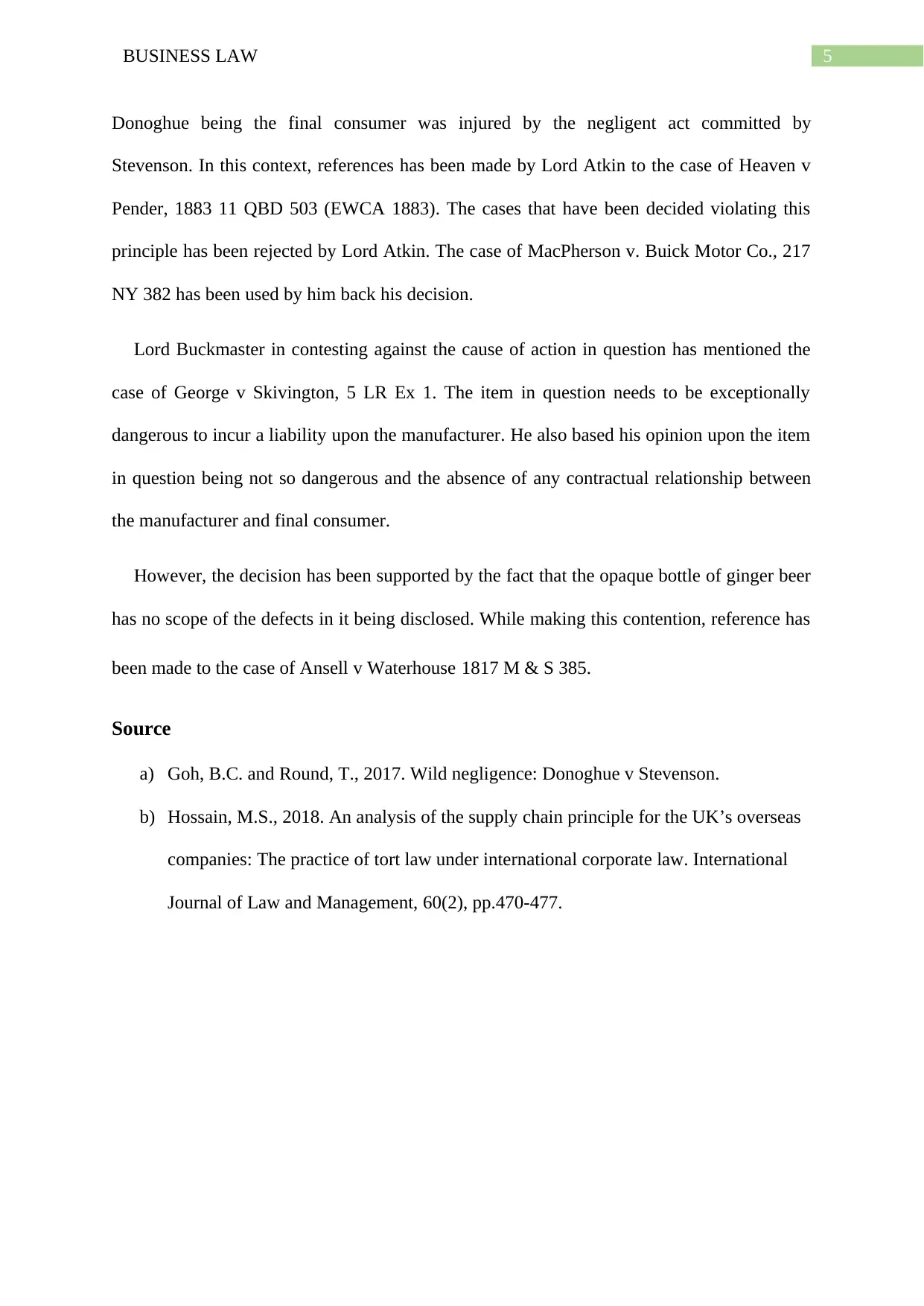
5BUSINESS LAW
Donoghue being the final consumer was injured by the negligent act committed by
Stevenson. In this context, references has been made by Lord Atkin to the case of Heaven v
Pender, 1883 11 QBD 503 (EWCA 1883). The cases that have been decided violating this
principle has been rejected by Lord Atkin. The case of MacPherson v. Buick Motor Co., 217
NY 382 has been used by him back his decision.
Lord Buckmaster in contesting against the cause of action in question has mentioned the
case of George v Skivington, 5 LR Ex 1. The item in question needs to be exceptionally
dangerous to incur a liability upon the manufacturer. He also based his opinion upon the item
in question being not so dangerous and the absence of any contractual relationship between
the manufacturer and final consumer.
However, the decision has been supported by the fact that the opaque bottle of ginger beer
has no scope of the defects in it being disclosed. While making this contention, reference has
been made to the case of Ansell v Waterhouse 1817 M & S 385.
Source
a) Goh, B.C. and Round, T., 2017. Wild negligence: Donoghue v Stevenson.
b) Hossain, M.S., 2018. An analysis of the supply chain principle for the UK’s overseas
companies: The practice of tort law under international corporate law. International
Journal of Law and Management, 60(2), pp.470-477.
Donoghue being the final consumer was injured by the negligent act committed by
Stevenson. In this context, references has been made by Lord Atkin to the case of Heaven v
Pender, 1883 11 QBD 503 (EWCA 1883). The cases that have been decided violating this
principle has been rejected by Lord Atkin. The case of MacPherson v. Buick Motor Co., 217
NY 382 has been used by him back his decision.
Lord Buckmaster in contesting against the cause of action in question has mentioned the
case of George v Skivington, 5 LR Ex 1. The item in question needs to be exceptionally
dangerous to incur a liability upon the manufacturer. He also based his opinion upon the item
in question being not so dangerous and the absence of any contractual relationship between
the manufacturer and final consumer.
However, the decision has been supported by the fact that the opaque bottle of ginger beer
has no scope of the defects in it being disclosed. While making this contention, reference has
been made to the case of Ansell v Waterhouse 1817 M & S 385.
Source
a) Goh, B.C. and Round, T., 2017. Wild negligence: Donoghue v Stevenson.
b) Hossain, M.S., 2018. An analysis of the supply chain principle for the UK’s overseas
companies: The practice of tort law under international corporate law. International
Journal of Law and Management, 60(2), pp.470-477.
⊘ This is a preview!⊘
Do you want full access?
Subscribe today to unlock all pages.

Trusted by 1+ million students worldwide
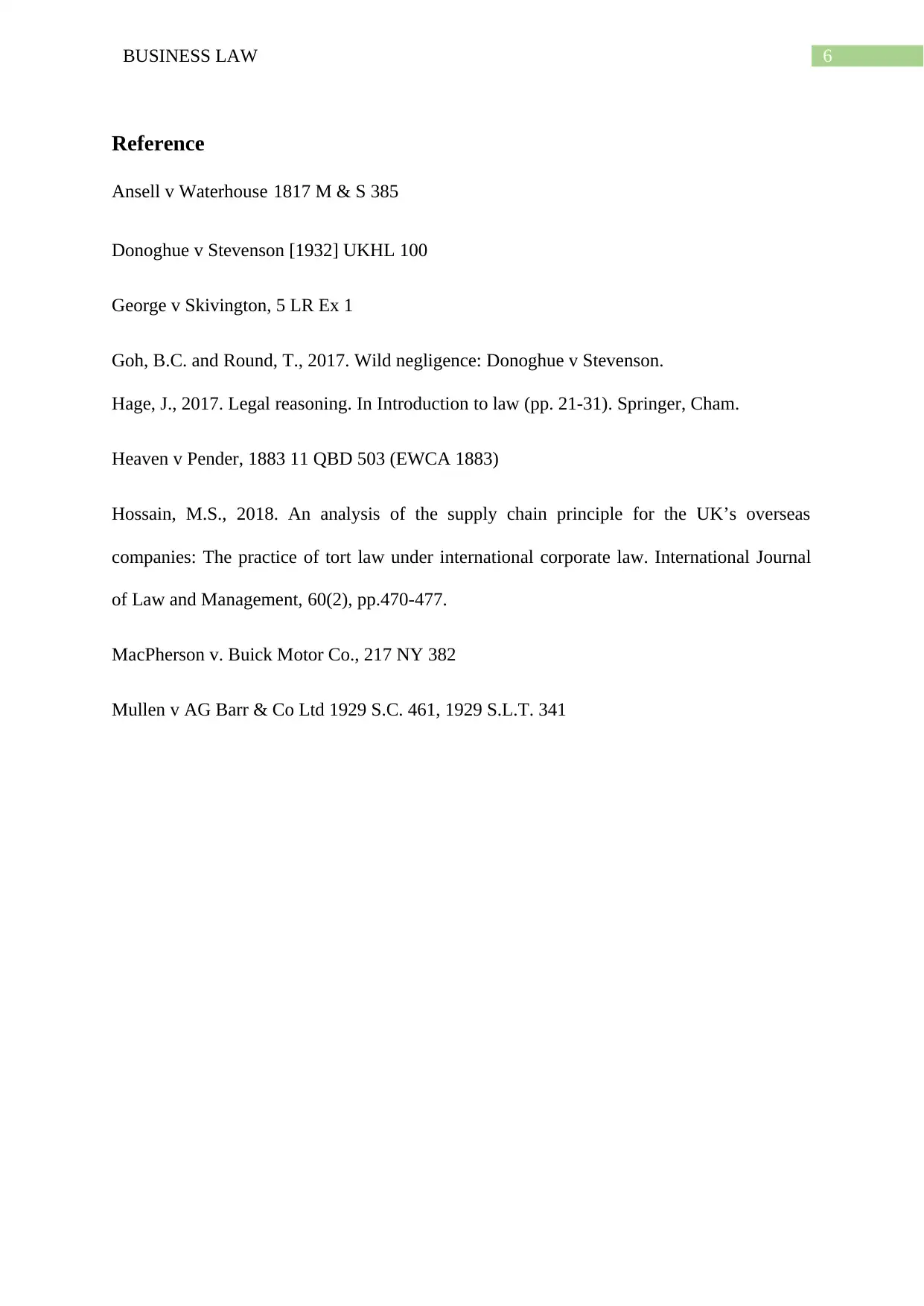
6BUSINESS LAW
Reference
Ansell v Waterhouse 1817 M & S 385
Donoghue v Stevenson [1932] UKHL 100
George v Skivington, 5 LR Ex 1
Goh, B.C. and Round, T., 2017. Wild negligence: Donoghue v Stevenson.
Hage, J., 2017. Legal reasoning. In Introduction to law (pp. 21-31). Springer, Cham.
Heaven v Pender, 1883 11 QBD 503 (EWCA 1883)
Hossain, M.S., 2018. An analysis of the supply chain principle for the UK’s overseas
companies: The practice of tort law under international corporate law. International Journal
of Law and Management, 60(2), pp.470-477.
MacPherson v. Buick Motor Co., 217 NY 382
Mullen v AG Barr & Co Ltd 1929 S.C. 461, 1929 S.L.T. 341
Reference
Ansell v Waterhouse 1817 M & S 385
Donoghue v Stevenson [1932] UKHL 100
George v Skivington, 5 LR Ex 1
Goh, B.C. and Round, T., 2017. Wild negligence: Donoghue v Stevenson.
Hage, J., 2017. Legal reasoning. In Introduction to law (pp. 21-31). Springer, Cham.
Heaven v Pender, 1883 11 QBD 503 (EWCA 1883)
Hossain, M.S., 2018. An analysis of the supply chain principle for the UK’s overseas
companies: The practice of tort law under international corporate law. International Journal
of Law and Management, 60(2), pp.470-477.
MacPherson v. Buick Motor Co., 217 NY 382
Mullen v AG Barr & Co Ltd 1929 S.C. 461, 1929 S.L.T. 341
1 out of 7
Related Documents
Your All-in-One AI-Powered Toolkit for Academic Success.
+13062052269
info@desklib.com
Available 24*7 on WhatsApp / Email
![[object Object]](/_next/static/media/star-bottom.7253800d.svg)
Unlock your academic potential
Copyright © 2020–2025 A2Z Services. All Rights Reserved. Developed and managed by ZUCOL.





